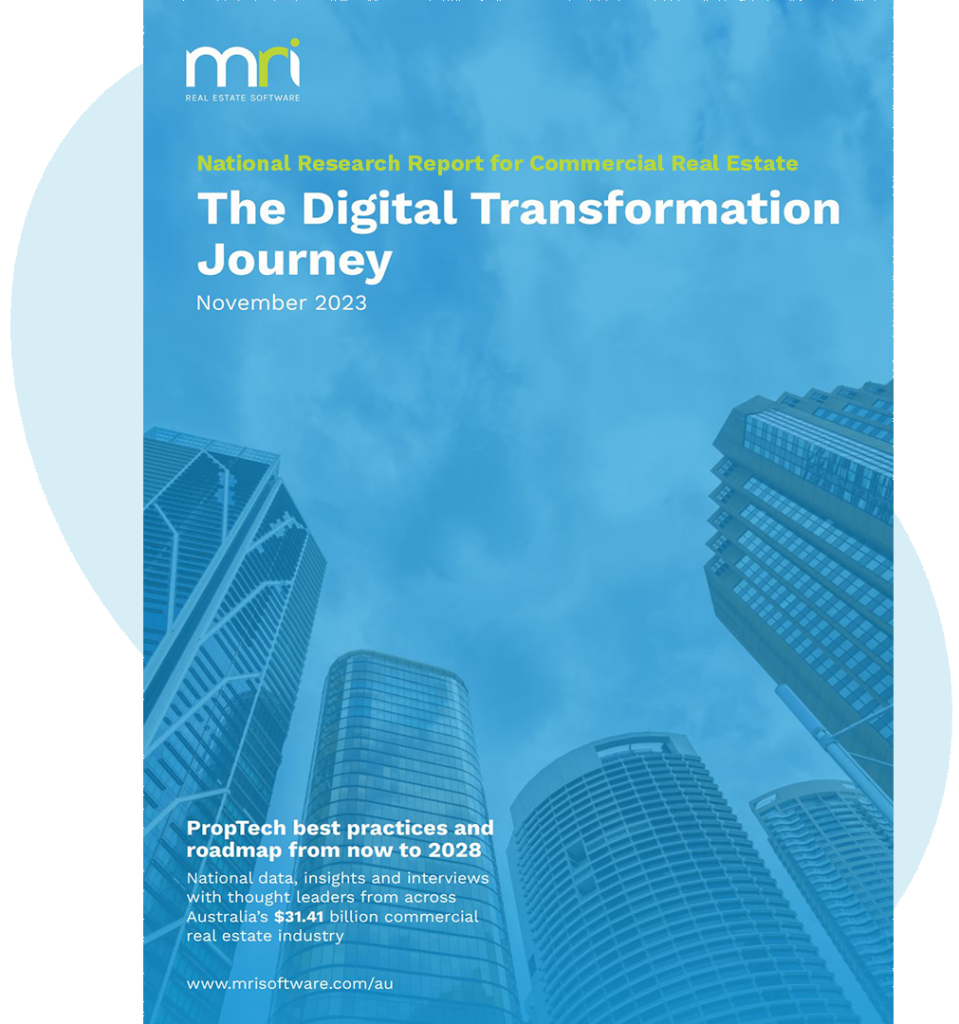Voices of Digital Transformation: Expert Insights Series
Joanna Marsh, Head of Venture Investment & Advanced Analytics, Investa
Our expert insights series is based on outreach conducted by MRI Software for its national research report for the commercial property sector – Voices of Digital Transformation Report.
About Investa
Investa is an Australian real estate company specialising in innovative approaches to property investment, management and development, leveraging state-of-the-art solutions to optimise the value of assets under its management.
We spoke with Joanna Marsh, Investa’s Head of Venture Investment & Advanced Analytics, who shares her observations on how to view proptech solutions through a strategic lens. She tells us how Investa identifies and adopts relevant technology solutions within a broader framework focused on value creation.
The Digital Transformation Journey
PropTech best practices for commercial real estate from now to 2028.

Navigating business challenges
Joanna pointed out that legacy technology in the real estate industry often relies heavily on paper-based systems, which lack effective guardrails. Time is wasted on verification and repeating tasks, and people can unintentionally get caught up in inefficient workarounds, following practices passed down by previous colleagues or supervisors.
People end up spending a huge amount of their time checking things and duplicating effort. And it can be hard to hand things off efficiently between operational and management teams. While it’s no fault of the humans, legacy technology coupled with an over-reliance on manual processes can cause errors and a loss of understanding.
– Joanna Marsh, Investa.
These habits can accumulate over time, creating a pattern that’s hard to break.
“We have to acknowledge that it’s not necessarily the technology itself, but the way issues are interconnected that causes frustration and hampers efficiency. And the fact that the ‘baton’ gets dropped in between,” Joanna added.
“The solution might lie in untangling a web of process issues, data problems or tech debt,” she suggested. “Or it could simply be that the goal posts have shifted due to a change in ownership of buildings or asset classes, leading to knowledge gaps within the organisation. Facing these issues holistically – with technology as one piece of the puzzle – is the way forward.”
Implementing new solutions
Joanna said that, when it comes to new technology, Investa keeps higher-level goals at the heart of its efforts.
“It’s not just about finding a tech fix; it’s a matter of aligning with our business strategy and its core pillars. Mapping the impact across the business is also super important and, as a result, we give lower priority to isolated problems. It’s all about having a well-structured portfolio approach and acknowledging that we can’t overhaul everything without causing change fatigue,” she said.
In fact, problem-solving is just one of many ways to look at how new tools can help. Another approach is to explore the unexpected opportunities these solutions might bring.
Sometimes, the goal isn’t actually about solving a problem, it’s about embracing opportunities. This is where data, machine learning and LLM models can help – they give you a way to get granular and weigh up opportunity and risk more comprehensively.
– Joanna Marsh, Investa.
“Ultimately,” Joanna said, “We delve into the options and use a criteria-based approach that takes compatibility, cost and risk into consideration. Having a long term view becomes especially critical for future developments, where decisions made now can impact us down the line.”
“If tech is the answer, we analyse the choices: do we build, buy or partner? Using relative comparison scoring, we evaluate options against each other, taking into account our legacy and current tech setup to ensure compatibility and minimise risk.”
Managing change and measuring success
Joanna believes it’s important to strike a balance between fully elaborating the business case with all the change management and operational costs factored in, versus testing the waters with pilots and incremental rollouts. “The former can be unwieldy and the latter can cause ‘death by pilot’ with a bunch of test projects that never get fully implemented,” she said.
Having a strong internal champion who is properly resourced and actually cares is vital because people will inevitably push back! Delivering a quick, wow-factor win that excites everyone really helps.
– Joanna Marsh, Investa.
“It’s also important to have someone drive the implementation once it’s up and running so it doesn’t fall by the wayside after all the hard work,” Joanna added.
“To measure success Investa focuses on business KPIs instead of just usage, as that can be deceiving. With leasing, for example, we use advanced analytics and AI models to look at the quantity and quality of new leads, and how many of those converted.”
Dealing with data security
According to Joanna, Investa takes data security very seriously. “With the rise of AI, ensuring accuracy becomes even more crucial,” she said.
“We need to focus on the metadata and the lineage of each data point, and manage permissions right down to specific fields. This involves setting up internal barriers and closely monitoring data movement.”
It’s vital to have the technical capability to back up these efforts in line with comprehensive privacy, security, and cyber policies. And of course, it’s about finding the right balance – safeguarding data while encouraging innovation and allowing the flexibility needed for creative breakthroughs.
– Joanna Marsh, Investa.
Lessons and best practices
Joanna explained that Investa has a strategic approach to selecting technology – one that’s grounded in assessing risk and maximising returns. In addition, the business always looks at how to balance ROI with future-proofing.
It’s also important to remember that people are key to implementing any new technology. “Collaboration and buy-in depend on having a board-approved framework in place. This establishes a shared understanding, streamlines decision-making and promotes a more seamless integration into your change portfolio.”
We focus on finding the ‘just right’ blend of keeping innovation flowing with an agile approach, while also ensuring we have a solid plan for making it operational down the road.
– Joanna Marsh, Investa.
Her advice for others is to “Run small, sharp experiments. Test one element at a time and iterate. The key to encouraging action involves making the smallest, safest moves that yield meaningful insights.”
Proptech trends to watch
Joanna believes that purpose-built large language models will bring transformational change to the real estate industry.
Unlike finance with its Bloomberg-based knowledge base, real estate lacks a singular data source. We have a huge amount of unstructured property-related data and the standard LLMs aren’t going to cut it. You need industry-specific models that are trained to liberate data from documents and databases.
– Joanna Marsh, Investa.
“Things get even more exciting with generative capabilities because they reduce friction and allow people to ask questions,” she said. “It’s this dual-functionality – blending data extraction with interactive querying – that holds immense promise for revolutionising the industry.”
Download a copy of the Voices of Digital Transformation Report here and learn more about how Australian real estate businesses are embracing proptech best practices to help achieve strategic goals.
Digital Transformation and Proptech Best Practices
Like most industries, the commercial real estate sector is going through a rapid digital transformation. To better understand what specific challenges technology is now tasked with solving, we conducted an in-depth survey with over 100 leading commer…

